Gastronomy for Good: Daily Table’s Mission-Based Gastronomy
Today, we are highlighting more work from students in Steven Finn's course: MET ML626 - Food Waste: Scope, Scale, and Signals for Sustainable Change. This is another post from Megan Perlman.

Traditional notions of gastronomy may conjure up a vision of white-toqued students making milles-feuilles, a critic with a notepad at a fancy restaurant, or the study of how terroir and farming methods impact a region’s grape varietal. While these certainly belong in the purview of gastronomy, Boston University’s Master of Arts in Gastronomy also affords us the opportunity to learn more about the social, cultural, and historical intricacies of how food and people connect. This includes connecting with local food activists and organizations making a difference in our communities.
There has never been a greater need for activism. The statistics are bleak. With rising cost of living showing no signs of abatement, an estimated 1.9 million adults in Massachusetts went hungry last year. The Harvard Political Review further explains the problem: “Residents of lower-income areas may be miles away from their nearest source of fresh, nutritious food…Fast-food chains and easily accessible corner stores sell mainly non-nutritious ‘junk’ food. Available fresh food, if there is any, is then much more expensive than ultra-processed alternatives, worsening the lack of access to healthy foods by low-income residents.”
How do we address these entrenched inequities? One innovative local organization, Daily Table, is dedicated to providing “fresh, tasty, convenient and nutritious food to communities most in need at prices everyone can afford.” Daily Table operates a series of grocery stores and food hubs in communities that are often underserved.
Their retail spaces in Central Square, Mattapan, Salem, Dorchester and Roxbury are designed to offer a range of healthy, fresh, and affordable foods. High-quality and nutritious food is available at prices that are lower than traditional grocery stores.
How are they able to do this? Michael O’Driscoll, the organization’s Director of Operations, and Chris Austin, its Executive Chef, spent an evening in our test kitchen breaking down their multifaceted strategy while also cooking us some of their delicious recipes.
O’Driscoll shared that while a majority of Daily Table’s outside funding comes from grants and corporate donations, sales revenue covers 70% of their operating expenses and, impressively, two of the stores already break even. This operational efficiency allows grants and donation funds to be primarily directed into capital investments with the goal of expanding the organization's footprint.
Daily Table has partnerships with food manufacturers, retailers, and local producers that allow them to get food via donation or at deeply discounted prices. These “opportunity buys” require their procurement team (Austin called them “treasure hunters”) to be nimble and creative, seeking out and securing food that is expiring, surplus, or that won’t be sold by retailers simply for cosmetic reasons. Austin recounted receiving a shipment of salmon that had been rejected by a retailer because the color of the fish wasn’t orange enough simply because they had been feeding on prawns that were more white than pink. Then it’s his job to scramble to create a recipe or dish using the unexpected food. In fact, 400,000 lbs. of food were acquired as low-cost “opportunity buys” last year alone.
As an aside, this exemplifies the close connection between food scarcity, sustainability, and reducing environmental impact: those 200 tons of food fed many community members experiencing food insecurity instead of going to the landfill. In fact, anything expiring in Daily Table’s stores is given away or donated to other groups as part of their mission to cut food waste.
Austin, who grew up in Dorchester, works out of the commissary kitchen in the Dorchester store. He explained how he adapts each store’s recipes and offerings based on the ethnic communities they serve. Keeping community impact in mind, Daily Table does not sell junk food and focuses on nutrition. Collard greens are an example of a classic dish Austin adapts in a way that is familiar enough to be culturally appropriate but with a healthier twist: He cooks down the collards with vinegar and smoked paprika to mimic the smoky flavor of the traditional ham hock or bacon without its calories and sodium. Daily Table employs members of its local communities who share their own traditional recipes, including the recipe for their now highly popular jerk chicken.
None of this would matter if Daily Table didn’t focus on affordable pricing. While a Big Mac meal now costs an average of $9.29, Daily Table provides housemade grab-and-go food like sandwiches, smoothies, pre-packed complete meals, salads, burritos, and wraps that are cheaper and healthier than fast food. Customers can pick up a healthy wrap from $2.39 to $3.49, a salad for $1.99, or a full meal with two chicken legs, brown rice, and collard greens for $3.99. And while financial sustainability is a long-term goal for the organization, providing healthy food at a low cost for their customers always comes first: O’Driscoll revealed that Daily Table will sell items like their 39 cent/lb. bananas at a loss in order to keep their offerings accessible to all.
Daily Table currently serves 11,000 customers per week in five communities using their model of creativity, compassion, and collaboration; and the organization is continuing to grow.
Austin put it best: “Daily Table is not just a store, it is a food justice social enterprise.”
That’s a version of gastronomy we can all get behind.
From Global to Individual: Getting Personal with Food Waste
Today, we are highlighting work from students in Steven Finn's course: MET ML626 - Food Waste: Scope, Scale, and Signals for Sustainable Change. This post comes from Emily Shawn.
But I don't contribute to the global food waste problem, right? I'm not the one throwing away my meals and clogging up landfills.
Am I?
Household waste matters, and way more than I thought.
I'm sure I'm not alone in thinking that I'm just not that wasteful. I usually finish my leftovers. I do my best to get through the finicky salad mix before it wilts. I compost, for goodness’ sake. I'm not really part of the global food waste problem. Am I?
I, like many consumers, have grown into the habit of thinking of food waste on a grand scale--that the waste produced by restaurants, businesses and agriculture is so extreme and severe that my small efforts as one individual person cannot possibly have any significant effect. Yet--and disastrously so--this "not my problem" attitude is not unique to me, nor are my thoughts that my personal waste is insignificant. When this same "not my problem" idea is echoed by the millions of people in Massachusetts, the United States, and the world, individual household food waste is in fact a driving factor in how sustainable we as humans can be with our food and our resources.
The NRDC in 2017 cited these graphs showing where food waste in three major cities came from:

Uh-oh. That big green section? That shows residential food waste. That's the stuff in my refrigerator and pantry shelves right now--and the stuff sitting at the bottom of my trash can and out in my compost bin. Graphs like this offer a wake-up call.
Yes, grocery stores, manufacturers, and restaurants are guilty of waste, but household consumers take up a big piece of the pie.
Let's zoom in. It's one thing to think about food waste in cities I've never lived in. It's quite another--and far more jarring--to think of the food waste in my own city.
Locally and as recently as January 1, Axios Boston cited a ReFED study showing that most waste, in fact 48%, comes from households.

It's easy to assume that we all do better with our food than those other wasteful, careless people. However, do we really? Household waste is, if you look at the graphs, extremely significant. To reduce this in Massachusetts would be to reduce waste by almost 1 million tons!
Since a good first step in solving any problem is awareness, I stepped outside to gaze into the compost bin I share with my two roommates (and our two cats). As with many trash can mindsets, I don't usually think too much about my compost unless I'm scraping my table scraps into the countertop bin, and even then I try not to look too closely. It's turned into an out of sight, out of mind issue where it just fails to take up as much brain space as it should.
I popped open the 13-gallon bucket lid Tuesday afternoon and a big whiff of coffee grounds and something cruciferous hit me in the face. Ugg! It was about 1/3 full and had been emptied only Friday morning.
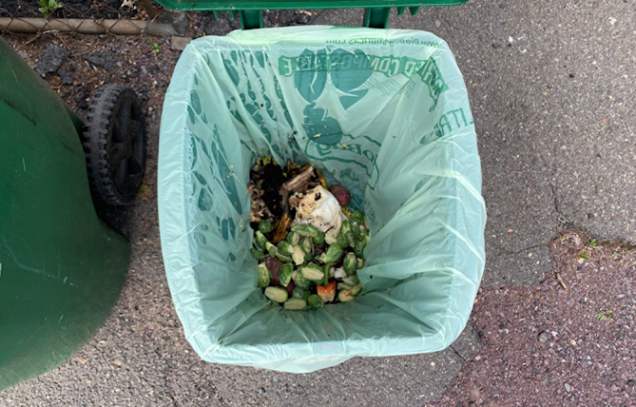
How did all those brussels sprouts get in there?! Are those...potatoes? Or mushrooms? What a sad place for these vegetables to end up.
I took a closer look. After having baked in 80 degree heat, none of this food was appetizing, but I'm sure it didn't start out that way when it was purchased. So, I challenge you to start getting cozy with your food scraps. I say this not to shame anyone for not finishing a meal--we've all been there--but to gain a personal awareness of your own food habits and waste patterns. At the end of the day, what gets scraped into the bin? I realized I had quite a bit of coffee grounds, banana peels, and lemon rinds--items that would not really ever have been edible. However I also had a lot of brussels sprouts and other veggies. Here's a closer look:

Grody, right? The smell alone was three-dimensional. In the future, I'd love to find a way to either cook these sooner, store them better, or not buy them at all if they're not going to be used.
Getting some good quality, up-close-and-personal face-to-face time with my compost is helping me see ways I can try to reduce my food waste. Some of what goes in the compost is hard to keep out, like banana peels, coffee grinds and eggshells - unavoidable food waste that is not edible for humans. Now, when I track my compost I'll keep a note of what I can most realistically try to reduce. Again, this isn't about shaming my or anyone's food consumption habits. This process is intended to bring awareness to my own waste and to look for ways I can reduce that. (Benefits include saving grocery money and actually eating my vegetables! Yay!) This process is also about the SDG (Sustainable Development Goal) Target 12.3. This Target calls for reducing food loss at the retail and consumer levels. The 2019 Food Waste Index shows that between households, retailers, restaurants and food service, 17% of available food ended up in waste bins. That's a scary number, especially when there are millions of people desperately in need of food.
I might not be able to control what restaurants and retailers do with their food, but I sure can decide what happens to the food in my grocery bags and my pantry shelves.
Here are some great ways to reduce personal household food waste and keep your wallet plumb, your trash can empty, and your stomach happy:
- Observe, observe, observe. Challenge yourself to get up close with your food scraps. Figure out what actually goes in the bin, and why. Whether it's over-purchasing, a meal no one liked, or the doomed wilty salad mix, track your food waste . Don't give the garbage the privilege of hiding.
- Store your produce and leftovers to last. Food and Wine has a great article with tips on storing produce for the longest life.
- Meal plan. Make a list, buy only what you need, pack up those leftovers for lunch or tomorrow's dinner.
- Donate eligible, usable food to pantries or micropantries. SDG Target 2.1 calls for ending hunger and ensuring access to safe and nutritious food for all people. It's a pretty huge problem, then, if nutritious food ends up in the scraps bin. (*A word of advice, pantries are not trash cans for food you didn't want to throw away yourself. Make sure any donations are still fresh and enjoyable. Read the requirements for food donations. Don't pass on the burden of throwing away food scraps to donation centers).
- Consider composting. Though composting is a band-aid solution to wasting edible food, it’s still a step up from food going into landfills on incinerators. Locally, the city of Medford offers eligible residents free participation, as does Boston.
It can feel so overwhelming to think about the need for sustainability policies that I really don't have the political power (yet) to implement or control. I can, however, look at my own trash and try to keep it as minimal as possible. At the end of the day, it’s up to me to determine what happens to the food that reaches my kitchen.
Saving the Planet in a Tasty(?) Way: Eat Bugs
Today, we are highlighting work from students in Steven Finn's course: MET ML626 - Food Waste: Scope, Scale, and Signals for Sustainable Change. This post comes from Megan Perlman.
With the world's population forecast to reach nine billion by 2050, food production will have to nearly double to keep up. Yet our planet simply cannot provide the water, land, and resources to sustain us at this pace. Livestock, especially beef, is a particularly inefficient use of resources per calorie consumed.
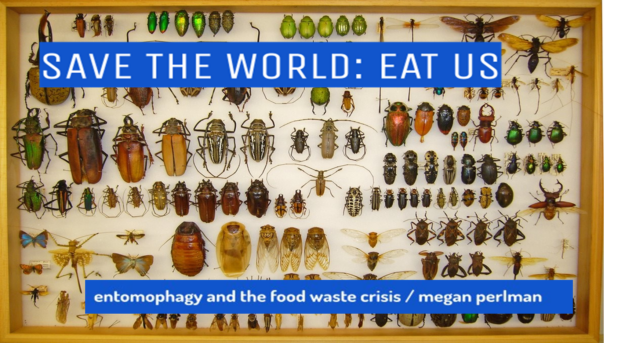
Enter: micro-livestock. The United Nations’ Food and Agriculture Organization’s groundbreaking 2013 paper, Edible Insects: Future Prospects for Food and Feed Security suggests that entomophagy can help food security and the planet.
In fact, simply diversifying our protein sources to include insects can aid in the achievement of many of the UN’s 17 Sustainable Development Goals (SDGs) – including goals 2: Zero Hunger; 6: Clean Water and Sanitation; 12: Responsible Consumption and Production; and 15: Life on Land.
Insects are highly sustainable. They take up little space, are easy to care for, and use very few resources (both environmentally and economically). They are nutritionally dense with protein, and minerally rich. Their benefits are far-reaching and can help slow some of our resource depletion quite quickly. Insects can offer the same protein and mineral content as regular meat or fish -- but at far less cost to the planet.
So why don’t we eat them? Well, bugs are gross. Contrary to all reason, the cultural “ick” factor seems the hardest to overcome, even though over two billion people globally already eat insects. Insects are arthropods, like lobster and shrimp. It’s completely arbitrary that in the Western world lobster is a delicacy and beetles are not – and it hasn’t always been that way either (at least not for the lobster). In fact, we are already eating insect products in our everyday foods (cochineal red dye and lac bugs confectioners’ glaze in food and candy, for example).
Restaurants and the culinary world have been early adopters – chef José Andrés has been serving chapulines (grasshopper tacos) at his Mexican restaurant Oyamel for 20 years, simply because it is a Oaxacan classic. Condé Nast’s Epicurious website amassed 4.7 million views on their 2022 video of chef Joseph Yoon demonstrating different ways to cook 19 edible insects.
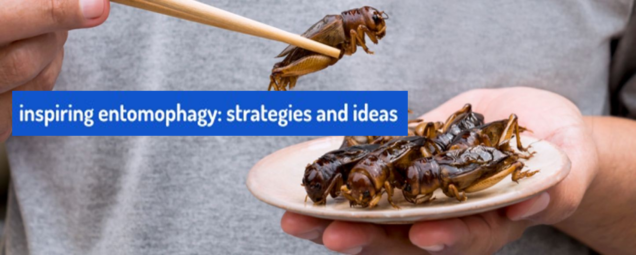
Marketing and awareness can help gain tremendous amounts of traction in normalizing entomophagy. Cultural norms are ingrained, but still moveable. Here are five strategies to move the needle:
1. Lower the Barrier to Entry
Containing up to 70% protein by weight, as well as vitamins and minerals such as iron and vitamin B12 with a neutral flavor, cricket flour is a safe and healthy on-ramp for those hesitant to eat an insect whole.
- Create and publish recipes using cricket flour.
- Stock cricket flour widely in grocery stores to normalize and associate it with other specialty flours (like Bob’s Red Mill).
2. Focus on Health
Edible insects may have superior health benefits due to their high levels of vitamin B12, iron, zinc, fiber, essential amino acids, omega-3 and omega-6 fatty acids, and antioxidants.
- Reach out to gyms, nutritionists, dieticians, hospitals, and health insurance companies to promote the health benefits of entomophagy to their clients.
- Promote protein bars using insect protein to be sold in health stores and gyms.
3. Appeal to Activists
Eating insects helps people and the planet, so courting influencers/activists is a good angle to spread awareness and cultivate entomophagy evangelists.
- Engage NGOs and non-profits whose interests align with entomophagy to assist in outreach, such as environmental, sustainability, hunger, food waste and conservation organizations.
- Create compelling marketing materials specific to particular goals, such as sustainability, health and nutrition, and low-cost food solutions.
4. Position Entomophagy as Cutting Edge in Haute Cuisine
Promote insects as a new frontier in cuisine, breaking boundaries and exploring culinary innovation.
- Offer groundbreaking chefs education on edible insect preparation and provide opportunities to create tasting menus using insects.
- James Beard Awards: invite nominated chefs to feature insects in the gala menu, introducing the entire fine-dining community to entomophagy with one meal.
- BU Gastronomy Program: invite a visiting professor to create a class on entomophagy, focusing on both the culinary aspect and the sustainability of insects as a food source.
5. Affect Change in Policy
Engage in lobbying to create impact at the policy level.
- Create regulatory framework for growing and selling insects.
- Advocate for food regulations so restaurants can serve edible insects without health code violations.
- Provide subsidies/incentives for insect farmers and manufacturers who market insect protein.
Commonwealth Kitchen: Innovating for a Sustainable, Equitable Food System
Today, we are highlighting work from students in Steven Finn's course: MET ML626 - Food Waste: Scope, Scale, and Signals for Sustainable Change. This post comes from Sarah Thompson.

If you are in Massachusetts, chances are, sipping on Madhrasi Chai, snacking on GRIA nuts, or dining at Clover Food Lab, you have enjoyed the fruits of labor of those in the Dorchester-based culinary incubator, Commonwealth Kitchen. In our Global Food Waste class (MET ML 626), we had the pleasure of hearing Kevin Doherty speak on his innovative work as Director of Culinary Operations at Commonwealth Kitchen.
Kevin discussed the mission and values that Commonwealth Kitchen was founded upon: equity, collaboration, and sustainability. I felt very uplifted by the emphasis that he placed on sustainable food manufacturing practices and how realistic he made them seem. Often when I hear the term “food manufacturing” I cringe in thinking about the amount of food that is wasted, or the items that are added to products to make them last months longer than natural foods in order to save the manufacturers a buck or two. As Kevin noted, to some unfortunately, “it’s not about the integrity of the product, it’s about the integrity of the profit.” But one of the most encouraging things Kevin mentioned was how Commonwealth Kitchen does everything in its power to seek ways to produce less waste and keep product ingredients to a minimum. It was very heartening to hear the way he connects with partners and suppliers in the New England region. For them, the goal is to source as much local product as possible and they’re not afraid to buy “seconds.” They work with local farmers as well as organizations like Boston Area Gleaners and take what’s given to them to create new recipes for university events, hospitals, and other healthcare facilities.
One of the coolest examples that we actually got to taste was a falafel developed from yellow field peas. The yellow field pea, I learned, is usually a cover crop, in this case grown by a farm in Maine to preserve soil health in preparation for the actual money-maker crop to follow. Now, at Commonwealth Kitchen, it is being used in a delicious way while providing triple bottom line benefit – providing income and nutrition while advancing circularity.
Another takeaway from this discussion involved the great ideas Kevin has about how to package products. Never have I met anyone that thinks more about the potential of 5-gallon buckets than Kevin does! But it was fascinating to hear his ideas on how they could be utilized to reduce packaging waste through a process involving transportation of food (to schools, for example) followed by cleaning and re-use.
The developments and creativity emerging from Commonwealth Kitchen are no small feat with regard to the number of businesses they support, the challenges of daily operations, and the way they achieve everything with sustainable efforts top of mind. Further, they offer a lot of other awesome programs that are geared towards helping BIPOC owners, caterers, and restaurants.
I would hope that a model of a culinary incubator like this with such high standards and high success rates could be multiplied several times over in various other cities across the country. I honestly think this could significantly help alleviate any accidental food waste. I would assume a new business owner might be naïve to all that goes into a successful business right away. I, for one, would not consider half of what we discussed in our class session – such as sourcing, packaging, and ingredient-management – but I think having a structured approach with the aid of professionals from the start can certainly lessen the waste that may come from trial and error of trying to grow a business on your own. While our class is tasked with thinking of impacts of our food practices on a global scale, particularly as they relate to the UN’s Sustainable Development Goal of “halving per capita global food waste at the retail and consumer levels and reducing food losses along production and supply chains,” it’s people like Kevin and the rest of the minds at Commonwealth Kitchen that inspire people like me to think what might be possible.
I think my classmates and I can certainly attest that what comes out of this kitchen is not only delicious, but very admirable (I have a new-found love for garlic scape pesto in more ways than one, that’s for sure)!
Course Spotlight: Sociology of Taste
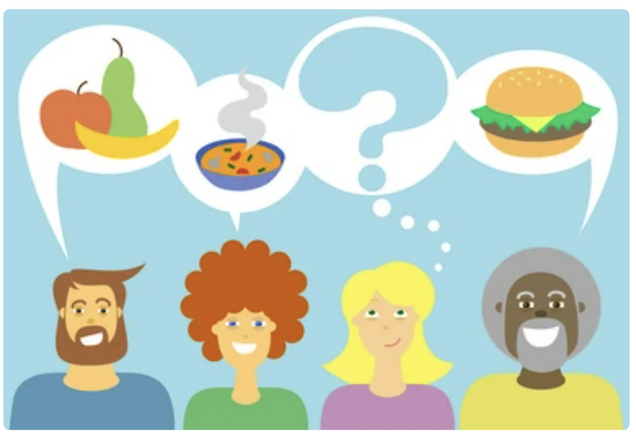
MET ML 716, Sociology of Taste, with Dr. Connor Fitzmaurice, will be offered as a 14-week online course for the Fall 2023 semester (Sept 5-Dec 18).
Course Description:
Taste has an undeniable personal immediacy: producing visceral feelings ranging from delight to disgust. As a result, in our everyday lives we tend to think about taste as purely a matter of individual preference. However, for sociologists, our tastes are not only socially meaningful, they are also socially determined, organized, and constructed. This course will introduce students to the variety of questions sociologists have asked about taste. What is a need? Where do preferences come from? What social functions might our tastes serve? Major theoretical perspectives for answering these questions will be considered, examining the influence of societal institutions, status seeking behaviors, internalized dispositions, and systems of meaning on not only what we enjoy--but what we find most revolting.
Fall registration is now live. This class is open to graduate students and upper level undergraduates. Non-degree seeking students may register here.
Student Work Wednesday- Featuring Kelly Fernandes
This week we're highlighting the work of Gastronomy student Kelly Fernandes. Kelly completed a project in which she created a summer program for the Food Waste course taught by Steven Finn here at Boston University's Metropolitan College.
Here's Kelly's vision for the project:
In one of my reflections, I spoke about creating a summer program that would be beneficial for low-income children. I decided to expand on that idea and used the blog post to showcase it.
I geared the content to show that SDGs can be achieved on smaller scales, starting with a small group within the community. I do think more SDGs can be touched with a similar model. Quality education can come in many forms and by teaching kids how to farm/harvest and subsequently cook, we are teaching them fundamentals and potentially minimizing future food insecurity.
This is an out-of-the-box approach but I do believe that we can reduce food waste by connecting younger generations to the source of their food, detailing how much effort goes into growing foods and why it is important to buy/consume only what is needed.
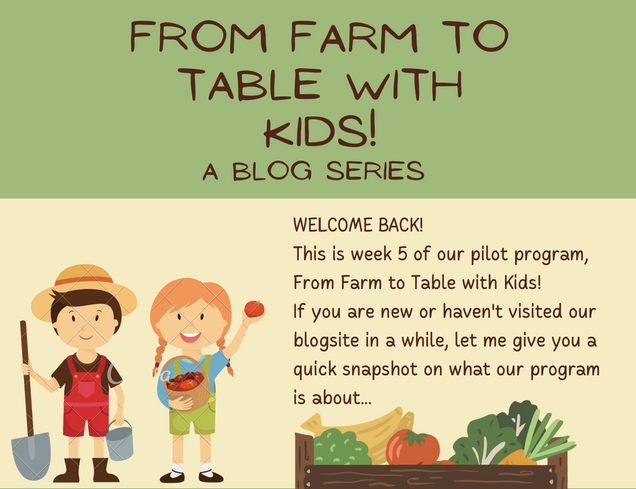
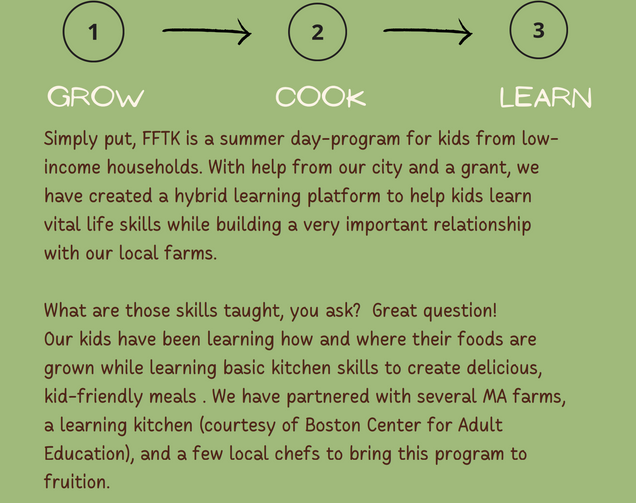
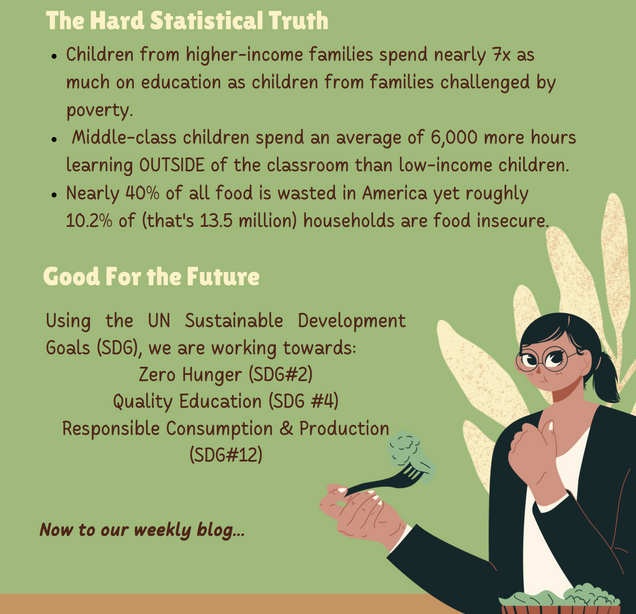
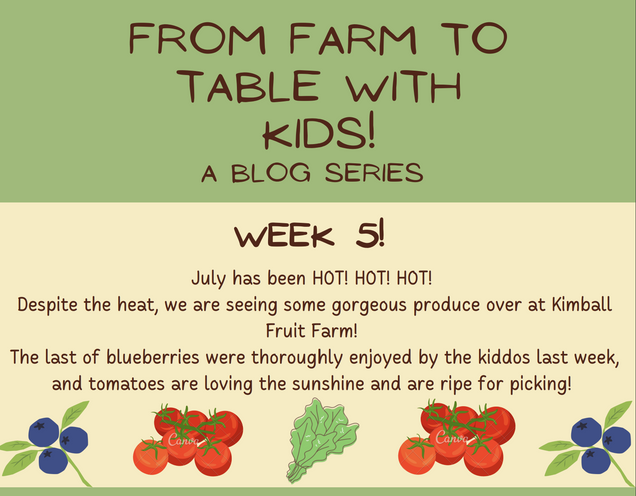
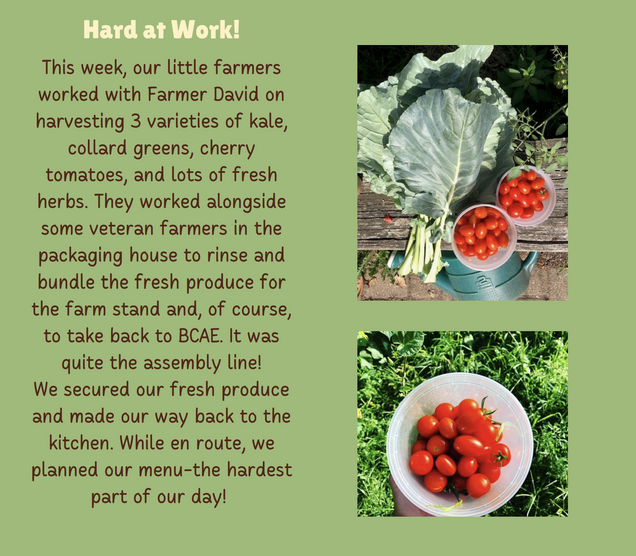
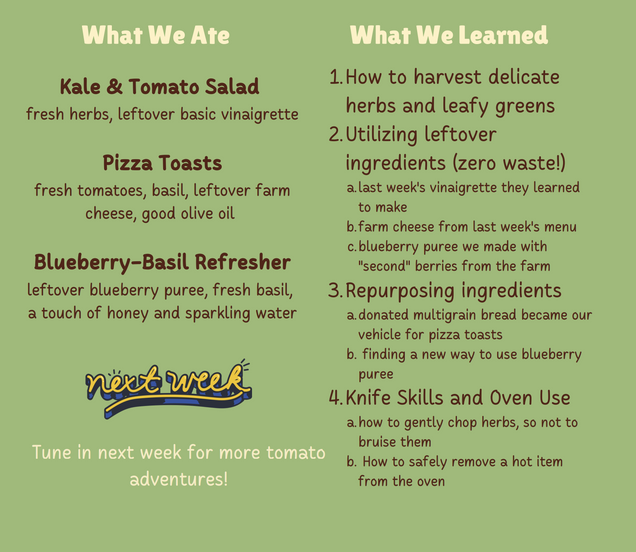
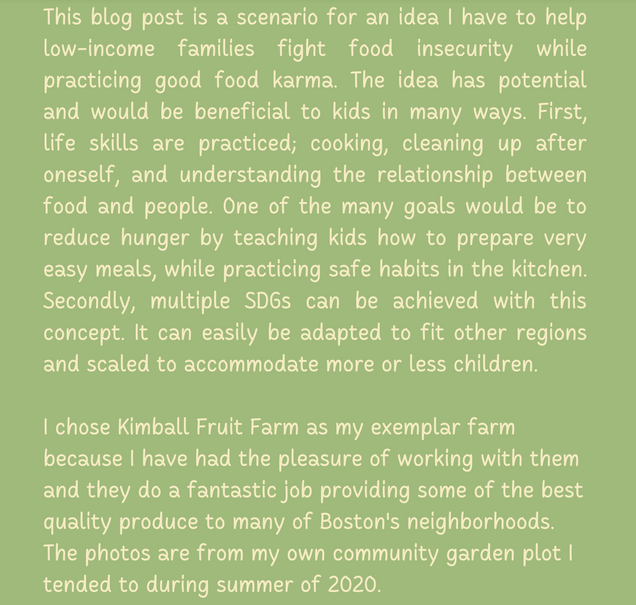
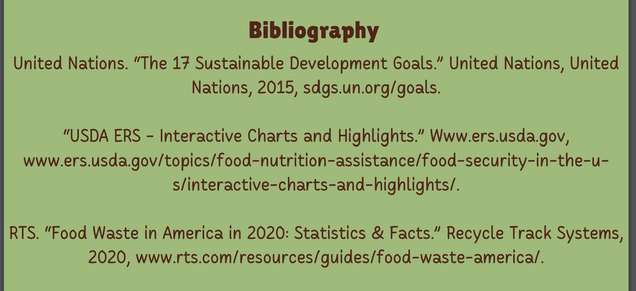
Course Spotlight: Urban Agriculture
Urban Agriculture
Urban Planning and Food Studies
MET ML 714 A1 (Summer 2- 2023)
Course Description:
Climate change demands immediate action and, to withstand altered temperatures, people need to eat healthy food and be active. Lessening drought in Africa or reducing food shipments are tasks beyond the reach of citizens but, with close-to-home urban agriculture, everyone can say, “I can do that.”
Through lectures, readings, and site visits, this interactive urban planning/gastronomy course will explore home vegetable gardens, leased plots, community gardens, and parks/sidewalks. Students will be challenged to come up with new ideas to increase the production of locally-grown vegetables and have more hands in the soil.
Learning Objectives:
- Evaluate existing local, state, or federal policies and programs related to the geographic locations (urban planning) of the different urban agriculture vegetable gardens to determine existence of fun factors, aesthetics, and quality produce.
- Assess policies and practices that best guarantee high yield and nutritional factors (food studies) including quality compost, no lead in soil, easy access to water, carefully selecting seeds, and regenerating soils.
- Understand how to write a peer reviewed journal article.
- Propose new policies related to urban agriculture in the community.
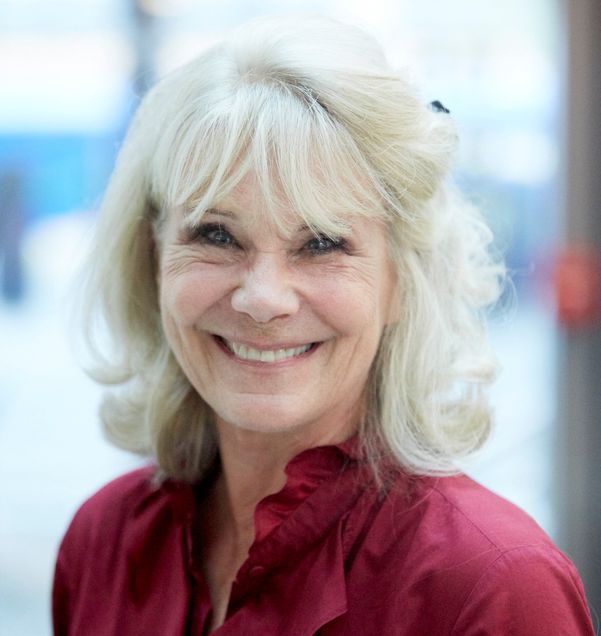
Here is a bit of Professor Lusk’s vision for the course:
During World War II, a winning idea was the Victory Garden. Madison Avenue posters were everywhere, 20 million gardens provided produce, and the Federal government served as the leader. Everyone got behind Victory gardens because of the war but now, gardens are isolated and occasional news stories cover individual case studies. An overall focus would elevate vegetable gardens for their contribution to public health, equity, and climate change under the banners of urban planning and food studies. Student’s ideas for new policies are essential. This course will ask students to think of the urban agriculture policy they would propose to cultivate the highest number of gardeners and vegetable yield.
There currently are awards for gardening but the major focus is on flowers and some community garden organizations discourage planting trees. With climate change, the necessity of removing hardscape, and the need to increase the number of people involved in growing vegetables, broadly showcased initiatives should focus on climate-responsive urban agriculture that includes criteria for the fun factor, visual aesthetics, trees to lessen heat island, and soil improvements to produce healthy vegetables. What policies would students develop to add pleasure and enjoyed food to the wide variety of urban agriculture opportunities: A) Single-family and multi-family housing pots or gardens; B) Individual leased plots; C) Large collective community gardens; D) Community owned property (parks and wide sidewalks). What initiative would a student explore or are they currently doing that increases close-to-home healthy vegetables? What about compost?
World War II ended and so did the Victory gardens. What ideas will students propose so urban agriculture is a publicly embraced and continuing answer to combat climate change?
The course is open to graduate students and upper-level undergraduates who may register via the Student Link.
Non-degree seeking students can find registration information here.
Student Work Wednesday- Featuring Nick Lucovich
This week we're highlighting the work of Gastronomy student Nick Lucovich. Nick completed this project on food waste in the cruise ship sector for the Food Waste course taught by Steven Finn here at Boston University's Metropolitan College.
A little about the author:
Born and raised in Pittsburgh, PA, Nick Lucovich has a passion for food deeply rooted beyond the local fare of pierogies and Primanti Brothers sandwiches. Frequent visits to the mushroom farm, where 3 generations of his family worked, ignited his interest for agriculture & food. He spent his teenage summers maintaining the grounds and hand packaging mushrooms. After earning a bachelor’s degree in Food Science from Michigan State University, Nick started his career at Giant Eagle gaining experience in food service and retail with roles in sensory evaluation, quality, food safety, merchandising, and procurement. Nick joined Nestlé in 2013 and is currently a product developer within their Baking Division, responsible for leading innovation, renovation and optimization projects from idea to commercialization. He loves the science of prototyping and scaling recipes to large manufacturing proportions that ultimately lead to new or improved products in the market.
Cruising Ahead with Less Food Waste

Photo by Royal Caribbean: Icon of the Seas, 2022
Touted as the largest cruise ship in the world, Royal Caribbean’s Icon of the Seas, capable of hosting up to 7,400 passengers is scheduled to set sail in January 2024 and features more than 40 restaurant concepts1, confirming that food is central to the cruise industry’s business model and a major part of the gastronomic experience for cruise passengers. According to Cruise Market Watch, there were 323 cruise ships total worldwide at the end of 2021, with a total passenger capacity of 581,2002. A large cruise ship requires a massive amount of food to feed the crew and guests daily, and unfortunately in the process, generates a significant amount of food waste.
More than one-third of all food produced globally is either lost or wasted each year3. This has far-reaching economic, environmental, and social impacts beyond just the tourism industry. Wasted food amounts to over 1-billion tons and nearly $1 trillion in global economic losses annually4. Resources used throughout the production, transportation, and distribution of food are also wasted, straining the environment with greenhouse gas emissions, degradation of soil health, and loss of biodiversity5. Saving just fifty percent of the food lost or wasted each year could end food insecurity worldwide5.
So how much food waste does a cruise ship typically generate? Unfortunately, food waste data for cruise ships is not widely published, but it’s estimated that as much as 30% of food loaded on a cruise ship daily goes to waste6. Of the food wastes sources, overproduction (50%) and plate leftovers (18%) represent the highest potential for savings, with production waste (trimming, etc.) and storage/expiration date losses accounting for the remainder7.
Most ships feature a variety of restaurants and dining options that are often included in the price of the cruise fare. Pre-paying for food allows travelers to relax from the worries of spending money on the ship. However, this all-inclusive model often leads to an atmosphere of food surplus and food waste. Travelers may feel the urge to take excess food from the buffet or order an extra dessert to achieve a sense of satisfaction with getting their money’s worth, but ultimately failing to finish their plate. Reducing food waste doesn’t need to take away from the gastronomic experience, but everyone has a responsibility to do the right thing for our planet. Cruise lines can display less food in dining halls, use smaller plates, and display signage to inform guests on the benefits of preventing food waste, which can improve their bottom line through savings on purchasing and disposal costs.
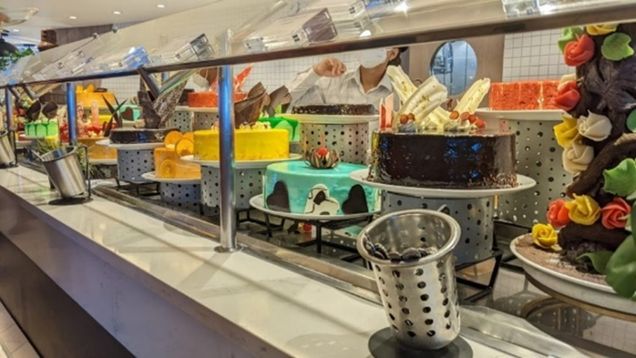
Prevention of food waste is by far the best option, but proper management of waste to avoid disposal in landfills or unprocessed discharge at sea is crucial for environmental sustainability as well. Cruise ships should aim to donate edible surplus at ports or compost food waste while avoiding emission-heavy incineration methods as well as bulk disposal of food waste at ports, destined for landfills. The International Convention for the Prevention of Pollution from Ship (MARPOL) permits discharge of unprocessed food waste into the sea outside of 12 nautical miles from the coast or 3 miles if it’s been ground, but fortunately corporations are taking initiative to reduce their environmental impact in effort to reverse a long history of environmental and health problems8,9,10. In 2022, Carnival Cruise Line became the first major cruise line to install bio-digesters fleetwide, capable of digesting 99 percent of the food put into them11.
The cruise industry has rebounded from the devastating impact of the covid-19 pandemic which drove passenger volume down 80% worldwide and has resumed its decades long trend as one of the fastest growing segments of tourism12. Passenger volume is expected to surpass pre-pandemic levels in 2023 and grow beyond 12% by the end of 2026, driving economic growth and job creation for the cruise industry, destinations, and developing countries13. The opportunity is now to ride this growth trend on a course toward reducing food waste to achieve target 12.3 within the United Nations’ Sustainable Development Goals (SDG’s), which aims to halve per capita global food waste by 203014.
REFERENCES
- “The World’s Largest Cruise Ship Will Set Sail In 2024.”October 20,2022. https://www.forbes.com/sites/michellegross/2022/10/20/the-worlds-largest-cruise-ship-will-set-sail-in-2024/?sh=7430085616e5
- Cruise Market Watch. “2021 Worldwide Cruise Line Passenger Capacity” https://cruisemarketwatch.com/capacity/
- “Food Wastage Footprint – Impacts on Natural Resources (Summary Report).” 2013. http://www.fao.org/3/i3347e/i3347e.pdf
- “Reflect, Rethink, Reconsider: Why Food Waste is Everybody’s Problem.” https://www.capgemini.com/insights/research-library/food-waste/
- US EPA. “From Farm to Kitchen: The Environmental Impacts of U.S. Food Waste.” Nov 30, 2021: https://www.epa.gov/system/files/documents/2021-11/from-farm-to-kitchen-the-environmental-impacts-of-u.s.-food-waste_508-tagged.pdf
- Research Features. ”Quantifying food waste on cruise ships: Experiences from China” April 15, 2021.https://researchfeatures.com/quantifying-food-waste-cruise-ships-experiences-china/
- “Reduction of Food Waste on Cruise Ships: A project report & implementation guide.” 2019.
- Power knot. “Cruise Ships Set Sail with Power Knot Biodigesters on Board.” June 15, 2021. https://powerknot.com/2021/06/15/cruise-ships-set-sail-with-power-knot-biodigesters-on-board/
- “Cruise industry faces choppy seas as it tries to clean up its act on climate.” July 27, 2022 https://www.reuters.com/business/sustainable-business/cruise-industry-faces-choppy-seas-it-tries-clean-up-its-act-climate-2022-07-27/
- “Cruise Ship Pollution is Causing Serious Health and Environmental Problems.” April 26, 2019. https://www.forbes.com/sites/jamesellsmoor/2019/04/26/cruise-ship-pollution-is-causing-serious-health-and-environmental-problems/?sh=2ffa388437db
- “Carnival Cruise Line Significantly Reducing Food Waste As First Major Cruise Line to Employ Bio-Digesters Fleetwide.” April 22, 2022. https://carnival-news.com/2022/04/22/carnival-cruise-line-significantly-reducing-food-waste-as-first-major-cruise-line-to-employ-bio-digesters-fleetwide/
- Cruise Line International Association: 2022 State of the Industry Report State Of The Cruise Industry Outlook 2022 | CLIA (cruising.org)
- United Nations. “The 17 Goals.” https://sdgs.un.org/goals
Course Spotlight: Food & Museums
Got Food? Got History? Go Public.
Food and Museums (ML623), Fall 2023
In Food and Museums (4 cr), we examine food-related displays and programming from
museums, living history museums, and folklore/folklife programs, as well as culinary
tourism offerings, “historical” food festivals, and food tours. Our goal is to compare
different approaches that use food to teach the public about food, history, cultural
heritage, science, art, even contemporary issues such as sustainability. How do we best
engage the public? How do we demonstrate the relevance of food as a historical subject?
How can we use food programming to connect our audience to issues that are critical
today—the future of food movements, for example, or the preservation and
understanding of cultural difference? We will consider how to engage the public in
different venues using food, material culture, media, and sensory experience.
This is a project-based course involving experiential and hands-on learning opportunities.
Students will design and install an exhibit using static objects. We will take a walking
tour of Jewish and Latinx communities in Chelsea, MA, and students will then design a
food-centric overlay to the tour. At Old Sturbridge Village, MA, a living history museum,
students will investigate the historical buildings and interpretive food programs,
including a behind-the-scenes visit, to consider how the missions of museums intersect
with the practicalities of using food for interpretation. Students will have the opportunity
to conduct interviews with immigrant cooks for use in an online exhibit related to food,
history, and culture. Finally, we plan to take a food tour with Bites of Boston to see how
neighborhood restaurants, grocery stores, and food businesses can serve as the focus of
cultural and historical programming. For the final project, student groups will design and
then lead us on their own food tour of Boston’s North End.
For more information, contact kmetheny@bu.edu.
Hope you will join us!
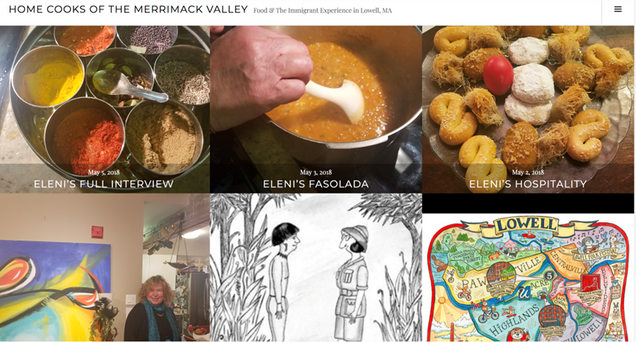
Student Work Wednesday- Featuring Richa Chitgopekar
This week we're highlighting the work of Gastronomy student Richa Chitgopekar. Richa completed this recipe recreation project for the Cookbooks and History course taught by Dr. Karen Metheny here at Boston University's Metropolitan College.
A little about the author:
Richa Chitgopekar is a food enthusiast with a keen taste for cuisines of different regions and communities. Through her food writing, she attempts to bring out the connection between people and food and how people have influenced her love for home cooking. She is that Culinary Luddist trying to find balance.
Thinking of Mrs. Fisher, through her Croquettes
Recreating Mrs. Fisher’s recipe as I add her in my list of people who have been a part of my food memories, she being the most unique. The heart and soul of the recipe is Mrs. Fisher’s. Just a few details are mine to ease the process for you, not only of making Fish Croquettes but also thinking of Mrs. Fisher every time you make them.
Have you ever wondered if you would enjoy your food as much if you didn’t have faces associated with it. Of somebody who made it, or served it with a smile. Or anyone else with whom you had the most interesting conversation over a meal. All of this is not deliberate, and most probably all is in the hindsight. The undeliberate aspect in the food was what my memories are made up of. In the most banal act of everyday cooking, a face comes alive in front of my eyes with each recipe. When I cook recipes that I have seen my mom cooking, I instantly recall her face, her saree, her neatly tied hair and the hurry on her face to finish everything before going to work. When I cook impulsively without rules, it’s the face of my father or uncles thinking and searching something frantically in the kitchen while fearing something on the gas would burn. Then there are numerous aunties, moms of my childhood friends, roadside eatery owners, relatives, in laws and many more who make up these memories. Every dish has a face associated and implicit in the minutest of the instructions.
Over time, these memories are complimented by those of some others whom I don’t know personally and have never tasted the food they made. Cookbooks have intrigued me, as a fad in around 2000s. These cookbooks were from people I had seen on TV, and more than the recipes it was how they thoroughly seem to be enjoying the orchestrated event of cooking on television with their aspirational kitchen . The appearance, the setup, the expressions and the emotions were much away from realities of life, and a pleasant change from the people who almost mechanically did the job every day. There was an urge to be what these Nigella Lawsons were on the screen, and I ended up cooking something in that attempt.
Then there are the new age regional food writers who weave stories around food and make it more than a procedural discourse. They talk of the minutest details of the community and the folklores which tell how food is intertwined in their everyday life. The writer, his or her writing style, folklores covered in the book and small but insightful details nudge us to try a recipe.
Most of the people I mentioned above have been privileged. Privileged to have everything in the kitchen to serve me good food with not much worries in life. Privileged (by the time I knew them) to cook on screen and write about food when they had all the resources. Most of my influencers thus, were privileged and good food was an entitlement and an indulgence both at the same time.
It was hard for me to imagine that there would be cookbook writers who didn’t have it easy in life. Cookbooks written when there were no resources, written by people who did not know to read and write. These cookbooks celebrate love of food and food as a way of expression of what they are. Through food, which they have spent most of their life doing, in some or the other way. Some spoke of hardships and some didn’t, but they rose over the hardships and documented their already established but not recognized culinary expertise.
The first name that comes to my mind is Mrs. Abby Fisher, whose book What Mrs. Fisher Knows about Old Southern Cooking (1881) is one of the first cookbooks published by an African American woman. Rafia Zafar in her book Recipes for Respect (2019) mentions about Mrs. Fisher and her book.
“What Mrs. Fisher Knows about Old Southern Cooking” does not refer to slavery or indenture. Its “complete instructor” gave readers seeking the right way to pickle or to form a croquette only the barest glimpse of the author’s private life. Yet while obliquely delineated, Fisher’s experiences as a black woman shaped her place in American cookery (201923).
As I read through, I could see the expertise that Mrs. Fisher gained after being a sought-after caterer and gaining confidence of many people, which Mrs. Fisher displays in her book through a list of supporters from San Francisco. From an enslaved cook to an author, her journey isn’t documented in as many words, and as one reads through one gets a vibe of a confident cook and a proud African American, who only uses cooking and nothing else to tell her story.
Such a strong woman had to be a part of my kitchen. Her recipe had to come alive. I zeroed down on Fish Croquettes (1881, 35) for many reasons. Living in a coastal area, I must ‘eat my landscape’. We are obsessed with meat on bone. We love pulling the leg of our Tandoori Chicken. In coastal areas, we take immense pride in teaching 3 year olds eating a whole fried fish without a single bone getting in their throat. So rarely a deboned version of fish is used in cooking. Sometimes entertaining asks for novelty in recipes, catering to multiple tastes and a bit of showoff about international food. Learning this recipe served all of these for me.
The origin of the word croquette is French, derived from croquer, meaning 'to crunch'. Though now, it seems to be a common across the world, known by different names. Webster (2022) defines Croquette as “A small often rounded mass consisting usually of minced meat, fish, or vegetable coated with egg and bread crumbs and deep-fried.” Mrs Fisher has some surprise for us in her recipe
The recipe looked simple enough to make and I could visualize the result would be fancy enough to entertain. It also had very easily available ingredients that hopefully people from any part of the world would be able to find. I have recreated the recipe, without the need to add or substitute any ingredients. I have also given a few substitutes and additions so that you still have a novelty factor, should you wish to make it frequently. The heart and soul of the recipe is Mrs. Fisher’s. Just a few details are mine to ease the process for you, not only for making Fish Croquettes, but also to think of Mrs Fisher every time you make them.
To start, lets see Mrs. Fisher’s recipe for Fish Croquettes
“One pound of boiled fish to one and a half potatoes. Chop a small piece of onion fine and mix with fish. Season with pepper and salt to your taste, Make them out in cakes like other croquettes. Roll them in dry corn meal. Fry in hot fat and send to table. “
The process starts with me landing up in a fish market early in the morning, to pick up the catch of the day. Since Mrs. Fisher didn’t say anything about which fish to be used, I picked up some Mackerel, which is the most commonly used fish for any recipe in this region that requires deboning, such as Fish Cutlets from the East Indian community.
Mrs. Fisher helps us with a separate recipe for boiling the fish
“See that the fish is well cleaned. Season with pepper and salt for two hours before putting in boil. Have your boiler with one quart of lukewarm water to receive the fish. Let it remain on quick fire for 20 min. if it is a very large fish, it will take 30 min to cook”
I cleaned the fish and salted the fish for two hours before putting to boil. I have used the fish the same day I bought from the market. In case you are using a frozen one, budget extra time.
The fish I have taken is a local variety of mackerel, which is about 6-8 inches in length. It looks like Mrs. Fisher has used a big fish. The cooking time in each case would vary. Mine was cooked well within 7-8 min of putting in boiling water. It should be flaky but still slightly pink from inside. You know your fish best, so use your experience for the cooking time.
Next allow it to cool and then debone it.
Coming back to the Fish croquette recipe. The recipe says “One pound of boiled fish to one and a half potatoes”. I don’t have a weighing scale in the kitchen, so I have used 1 cup of boiled deboned fish which I got from 3 mackerels of 6-8 inches each. I couldn’t really make out if it was 1.5 potatoes or 1.5 pounds of potatoes but I am assuming it was 1.5 pounds. To start with I have taken equal quantity of boiled mashed potatoes. 1 cup of deboned fish to 1 cup of boiled mashed potatoes. The recipe asks for a finely chopped piece of onion. I have taken about ½ cup of finely chopped onions. Salt and pepper to taste. This gave me a perfect texture to make the croquettes and the taste of the fish was not overpowered.
Mix all of this well and it should turn out to be of fine texture and be moldable into a patties or a ‘cake’ as Mrs. Fisher suggests. A word of caution. Onion tends to sweat if this mixture is kept for a long time after mixing. So, I would suggest make the cake patties immediately after mixing. I made about 8 cakes from the proportions used above. You can even make it smaller in size for it to be a perfect finger food.
Unlike the general description of Croquette, Mrs. Fisher surprised me by asking to use Cornmeal for the cover. So here comes the pleasant change of replacing the ubiquitous egg wash breadcrumb cover. A cup of cornmeal has been laying in my pantry for long, which I bought from Central India, where my hometown is. This white cornmeal is rare. Use yellow one if you have that. I am sure both will work fine.
Mrs. Fisher just says fry in hot oil and does not mention deep frying or shallow frying. The more common descriptions of Croquettes call for deep-frying. Since fish is very delicate, I prefer shallow frying for the fear of spluttering. But if you really want to deep-fry, maybe use some more potatoes for binding. I did not want the flavor of fish to be overpowered by using more potatoes, so shallow frying worked for me. Take a flat surfaced shallow pan. I am guessing any oil or lard should be fine, from the instructions. I used sunflower oil.
I served it with a freshly made dip of green tomato, coriander stems, garlic and green chilies.
| Mrs. Fisher’s recipe | Reconstructed recipe | |
| Ingredients | Fish, Potatoes, Onion, Salt, Pepper, Cornmeal, Oil | Same ingredients. Locally available varieties of all ingredients used |
| Servings | Not specified | Specified in the recipe card |
| Measurements | Pound and vague | Measured by cups |
| Tools used | Not specified | Specified in the recipe card |
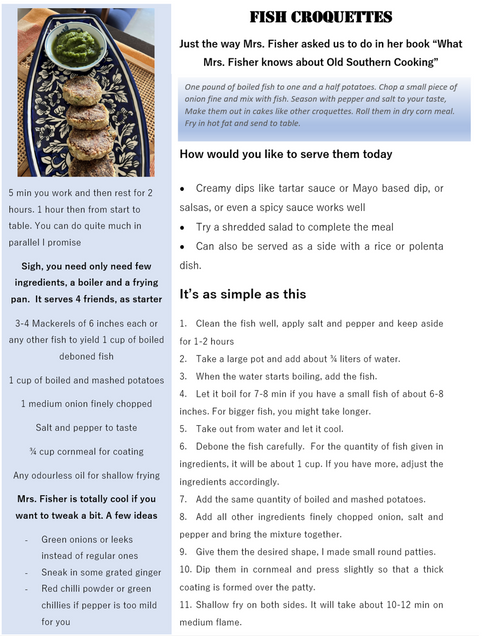
Bibliography
- Fisher, Abby., Hess, Karen. What Mrs. Fisher Knows about Old Southern Cooking: Soups, Pickles, Preserves, Etc: in Facsimile with Historical Notes. United States: Applewood Books, 1995.
- Zafar, Rafia. Recipes for Respect: African American Meals and Meaning. Greece: University of Georgia Press, 2019.
